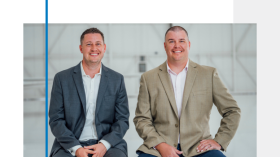
ESOP Training Class Helps Commercial Real Estate Firm With Succession Planning
A conversation with Mike Donovan, Managing Principal, Balke Brown Transwestern, Inc.

Balke Brown Transwestern, Inc.
Business Snapshot
Balke Brown Transwestern is one of the largest commercial real estate firms in the St. Louis region. The company’s management/ leasing/ development portfolio includes more than 57 projects, containing over 6.8 million square feet of Class A office, medical, industrial, retail, and multi-family residential space.
Business Leader
Mike Donovan, Managing Principal
Headquarters
St. Louis, MO
What are the biggest challenges you face as a business?
One of our biggest challenges was succession planning. The company was formerly owned by three principals. We were looking to provide tax-free liquidity, develop an employee retention and recruiting tool and be financially prepared as the owners approached retirement. In addition, we were looking for a banking partner who took the time to understand the intricacies of our business.
How did Enterprise help solve these challenges?
One of our owners attended an Employee Stock Ownership Plan (ESOP) class at Enterprise University, and he was very impressed with the content. This inspired further conversations with other banks, but Enterprise had a deeper understanding of the ESOP concept. Enterprise helped us develop a two-part financing structure that allowed the newly-created ESOP to purchase 51% of the stock. The terms allowed for flexibility, given the cyclical nature of cash flow in the real estate business – as well as the nature of the collateral that was pledged.
We also replaced our working capital line of credit at our previous bank, which enabled us to move over our depository relationship and maintain the same flexibility of operations. On the deposit side, we use remote deposit, ACH, wire services and a zero-balance account. We utilized the same services at our previous bank, but we now have saved on fees and receive a much higher level of service.
What is the impact on your business?
The ESOP was closed and the owners now own 49% of the company. We were able to invest proceeds in 1042 accounts, which creates tax-free liquidity that will be passed on to future generations. Our principals can now focus on driving revenue and continuing to grow the business while also fostering a greater sense of commitment to the organization from our employees.

